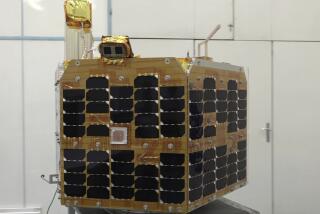Top-secret satellite is launched from Vandenberg
Barely visible in the dense fog at Vandenberg Air Force Base, a 19-story rocket roared to life and boosted a top-secret satellite into orbit.
Little is known about the spacecraft except that it belongs to the National Reconnaissance Office. The secretive federal agency is in charge of designing, building, launching and maintaining the nation’s spy satellites.
At 2:39 p.m. PDT, Thursday, the satellite was lifted into space atop United Launch Alliance’s Atlas V rocket.
The mission had been delayed six weeks because of a nagging glitch with equipment on the base northwest of Santa Barbara. But the problem was fixed, and despite the foggy weather all was “go” for launch.
The launch was shown on United Launch Alliance’s website, but it was cut off more than a minute after liftoff for security reasons. The rocket maker didn’t confirm by press time whether the launch was a complete success.
The Atlas V is powered by the booster and upper stage engines built by Pratt & Whitney Rocketdyne of Canoga Park.
The launch also delivered 11 smaller satellites, known as CubeSats, for the National Reconnaissance Office and NASA. The miniature satellites will study a wide range of things, including weather and space debris, and track maritime shipping containers.
CubeSats were developed by laboratories, government entities and universities.
One of the CubeSats, called Aeneas, was built by USC’s Space Engineering Research Center.
It has the ability to deploy a parabolic dish and track a point on the surface of the Earth. USC says it’s the first CubeSat with this tracking ability.
More to Read
Inside the business of entertainment
The Wide Shot brings you news, analysis and insights on everything from streaming wars to production — and what it all means for the future.
You may occasionally receive promotional content from the Los Angeles Times.











